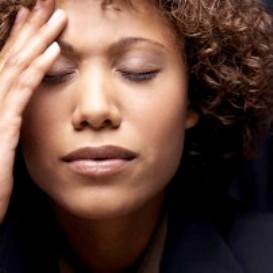Dehydration Headaches
Symptoms, Prevention & Treatment
by Merlin Hearn
Note: As an Amazon Associate I earn from qualifying purchases.
Dehydration headaches can range from a simple head pain to an intense migraine. In many cases, the severity of a headache is based on how dehydrated your body is.
Dehydration occurs when your body loses more water than what you put in. It can creep up on you quickly or it may be a systemic condition that you don’t even realize you have.
The average-sized adult will stay hydrated by drinking about 64 ounces (2 quarts) of water a day. For every 25 pounds overweight you are, add another 8 ounces to that amount.
Also, if you are engaged in physical activity or live in a dry climate, this amount should be increased.
Common Symptoms
Dehydration headaches are quite common and are usually experienced in the front of the head or on either side.
A common symptom of a dehydration headache is an increase in pain when moving the head.
Researchers are not entirely sure why dehydration causes headaches, but some scientists believe that it is the result of blood vessels narrowing to account for the decrease in fluid.
This makes it harder for oxygen and blood to get to the brain, giving you a headache.
Prevention
Fortunately, dehydration headaches are easily preventable. To prevent dehydration headaches, take these measures:
- Drink plenty of water! Make sure you are drinking at least 64 ounces of filtered water a day or half your body weight in ounces of water. For example, if you weigh 180 pounds, half your body weight is 90 – thus, you will need to drink 90 ounces of water (close to 3 quarts!) each day to stay hydrated. Remember that if you feel thirsty, you are already dehydrated. So be sure to be drink water even if you are not thirsty.
- Don’t replace another beverage for water. Other fluids and beverages do not replace your body’s physiological needs for plain water – clean water, that is. Drinking sodas and sports drinks and other sweetened beverages will actually contribute to an acidic condition in the body, the underlying cause of many illnesses. Drinking tea and coffee in moderation is ok. However, since caffeinated drinks are also diuretics, they will cause you to lose more water than you are taking in, increasing dehydration instead of improving it. Thus, you need to drink an additional glass of water for every cup of coffee you drink.
- Drink more water when active. If you are planning a day of activity, the best time to get hydrated is the 24 hours before your activity if you want to have optimal energy and performance ability. In the very least, try to drink at least 12 to 16 ounces of water about 1 hour before exercise. Replenish water every 30 minutes or so while active, and then replenish water as well as electrolytes after more than 60 minutes of exercise. Read more on replacing electrolytes in the body here.
- Avoid hottest part of the day for activity. Whenever possibly, plan your activity for cooler parts of the day when you will sweat less and be less likely to get dehydrated. Otherwise, seek out shade on hotter days and take rest as needed.
Treatment
If dehydration has already occurred and you are experiencing a headache, drink 32 ounces of water slowly over the following hour and take a break from activity for one to two hours.
Your body can only utilize about 12 to 16 ounces of water at a time, so don’t try to drink the 32 ounces all at once. In addition, it is dangerous to drink too much water too fast.
If you were exercising for more than one hour, it may be necessary to also replenish electrolytes.
You can make a simple home-made electrolyte drink with fruit juice diluted 50-50 with clean water, and adding 1 tablespoon of natural sea salt (such as Celtic sea salt or Himalayan crystal salt) per quart of beverage.
Stay in a cool environment and rest, making sure that you are not sweating too much.
If the headache is severe and does not subside, you may need to call your doctor or go to urgent care, especially if you cannot keep down your fluids or if you are feeling ill. This is a sign that you may need medical help and intravenous fluids.
That being said, prevention is still the best treatment for dehydration headaches so make sure to drink enough water throughout the day.
Reference
Medicalnewstoday.com; How to Recognize a Dehydration Headache; 2017.
Return from Dehydration Headaches to Dehydration Effects

If you would like to reproduce or republish this article or any other article on this site, feel free to do so but please include a reference or link to the article at WaterBenefitsHealth.com.
Sign Up for Our Monthly
Newsletter
Visitor Comments
"This was the best and most straight forward info on the net yet. I asked a question and got an answer that made sense. Thank you so much!" - Linderlinder
FINALLY!!! I have been wondering about this for years with no 'solid' answer. This is exactly what I've been wanting to know! Thank you for this share..." by Andy
"Thank you for the information, Nancy. I appreciate it. Your article and findings are very helpful, referring to dehydration." - Carolyn
"Lemon water is one drink both my wife and I can't drink. It upsets our stomachs. We are in our sixties and in very good health—well, better health now that we drink about 2 liters plus of water each day. It has made so much difference to our digestive systems and recovery every day. Thank you for your website and effort." - Rod



